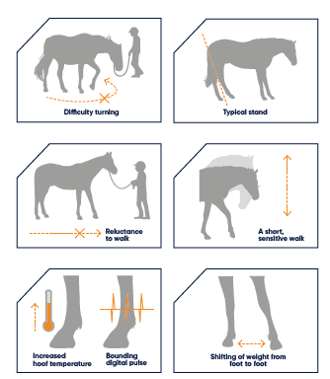Your horse can only benefit from healthy hooves. After all, they bear his full weight, day and night. Sensitive hooves can be problematic, not to mention painful. Problems from sensitive hooves tend to come back often. An ounce of prevention is worth a pound of cure.
Every horse can suffer from sensitive, tender hooves. This can have many causes. One is laminitis. Laminitis is a disease involving an inflammation in the hoof (specifically in the lamellae between the hoof corium and the horn). This inflammation causes considerable pain.
/ What triggers laminitis?
Laminitis is often associated with obesity or metabolic problems in horses and ponies. However, it can also be caused by excess sugars and starches, often in connection with too much protein. The body stores these substances and can no longer manage the waste products, leading to inflammation, and this can happen within a very short time. Problems frequently arise in spring and at times when grass contains excess fructans.
/ Signs of sensitive equine hooves
It is easy to recognise a horse with sensitive hooves by its stiff and rigid movements. In advanced stages, it will try to avoid putting weight on its hooves and adopt noticeably abnormal postures. Sensitive hooves are a problem that, once they have had it, many horses will experience regularly.

/ Prevention: a healthy weight
A horse with a healthy weight will have less risk of metabolic problems. Just like humans, horses have different needs. One horse may need lots of food to stay in shape, whilst another will get fat without eating excessively. The secret is consumption of the same amount of energy as is being expended. Horses get the energy they need to work from their feed, and carbohydrates are the largest source of energy. A horse that is not ridden can often take in sufficient energy from roughage, but one in training will need more. Horses get their energy mainly from carbohydrates. Sugar is a carbohydrate and canbe found in both roughage and in concentrate feed. Every horse needs sugar to perform work as well as for general well-being, but excess sugar can lead to health problems. Horses susceptible to metabolic issues should be given feed that is low in sugar and starch.
/ Treatment for inside and out
Has your horse already suffered from laminitis? Make sure your veterinary surgeon knows! And make adjustments to your feed and exercise plan. Feed your horse only low-energy, long-stalk roughage. Discontinue all concentrate feed and pasture grazing. Make sure your horse has a soft surface to stand on. If possible, motivate him to move about. This will stimulate blood circulation and speed up the healing process. Sensitive hooves may be the result of a metabolism imbalance. You can support your horse’s metabolism with Cavalor LaminAid. This feed supplement supports equine metabolism and digestion. It was specially developed to bring the body back into balance quickly. You can treat your horse’s hooves externally with Cavalor PodoSens. This soothing hoof oil reduces pressure.

